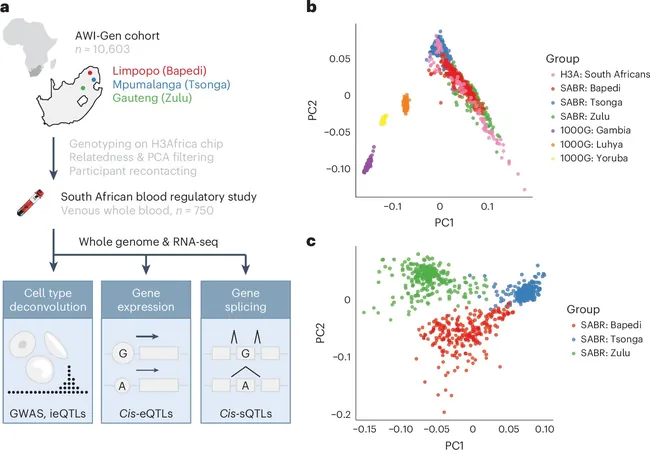
Revolutionary Dataset Unlocks Gene Insights for African Populations
2025-06-24
Author: Li
Unveiling the SABR Dataset
Introducing the South African Blood Regulatory (SABR) dataset—a groundbreaking resource that sheds light on how genetic variations influence blood traits and gene activities in African populations. This innovative dataset is set to transform our understanding of diseases such as diabetes and heart conditions.
Empowering Precision Medicine
With SABR, researchers gain an invaluable tool for predicting health risks and understanding why different populations respond variably to treatments. This dataset is a major leap toward truly inclusive precision medicine, correcting the historical underrepresentation of African populations in genomic studies.
A Voice from the Experts
Dr. Michèle Ramsay, Director of the Sydney Brenner Institute for Molecular Bioscience at Wits University, emphasizes the dataset's significance: "SABR connects genetic variation to gene activity, illuminating how certain genetic traits can heighten or lower gene expression. Our research will reveal crucial insights into why people from diverse genetic backgrounds have varying susceptibility to diseases and medication responses."
What Sets SABR Apart?
In collaboration with over 600 Black South African individuals, the SABR dataset stands out for its clearer portrayal of gene activity compared to existing resources. Dr. Stephane Castel from Variant Bio, a key collaborator, states, "SABR enhances the understanding of diseases and gene associations specifically linked to African populations."
Broader Implications Beyond Africa
While the focus is on African genetic research, the implications of the SABR dataset extend globally, enriching the field of precision medicine worldwide. Traditionally, studies like the Genotype-Tissue Expression (GTEx) project have concentrated on individuals of European ancestry, thereby limiting insights for diverse populations. SABR aims to rectify this gap.
Rich Insights from Blood
Though centered on blood-related conditions, the SABR dataset offers insights that resonate throughout the human body. Blood reflects a range of biological processes and health indicators, making it a valuable medium for understanding overall health dynamics.
Unearthing Hidden Genetic Variants
One of SABR’s significant achievements is the identification of regulatory variants often overlooked in European-centric datasets. These variants affect gene expression, playing a critical role in complex ailments such as cancer and autoimmune disorders. SABR recently unveiled a previously unidentified gene influencing lipid metabolism, a discovery that underscores the benefits of including African genomes in research.
Bridging the Knowledge Gap
The SABR is being utilized to enhance insights from major genetic studies, like the Pan-UK Biobank. By integrating gene regulation data with disease associations, researchers can better understand which genes are activated or suppressed in relation to health conditions. This connection is vital for translating genetic associations into biological realities and actionable treatments.
Equitable and Community Driven
SABR represents a pioneering model of equitable and community-engaged research. Data collection involved collaboration with rural and urban research sites across South Africa, ensuring that local communities are integral to the study. The openly accessible dataset is designed for global health research, providing invaluable data for academics and pharmaceutical developments.
A Call for Representation in Genomics
SABR challenges the conventional wisdom that larger datasets are inherently superior. Through a focused approach involving a few hundred individuals, insights drawn from AFRICAN diversity have already eclipsed findings from much larger, less diverse datasets. Dr. Ramsay notes, "Functional genomics has been a missing piece in African genetic research. Now we’ve built it with African scientists, for the benefit of African health and beyond."


 Brasil (PT)
Brasil (PT)
 Canada (EN)
Canada (EN)
 Chile (ES)
Chile (ES)
 Česko (CS)
Česko (CS)
 대한민국 (KO)
대한민국 (KO)
 España (ES)
España (ES)
 France (FR)
France (FR)
 Hong Kong (EN)
Hong Kong (EN)
 Italia (IT)
Italia (IT)
 日本 (JA)
日本 (JA)
 Magyarország (HU)
Magyarország (HU)
 Norge (NO)
Norge (NO)
 Polska (PL)
Polska (PL)
 Schweiz (DE)
Schweiz (DE)
 Singapore (EN)
Singapore (EN)
 Sverige (SV)
Sverige (SV)
 Suomi (FI)
Suomi (FI)
 Türkiye (TR)
Türkiye (TR)
 الإمارات العربية المتحدة (AR)
الإمارات العربية المتحدة (AR)